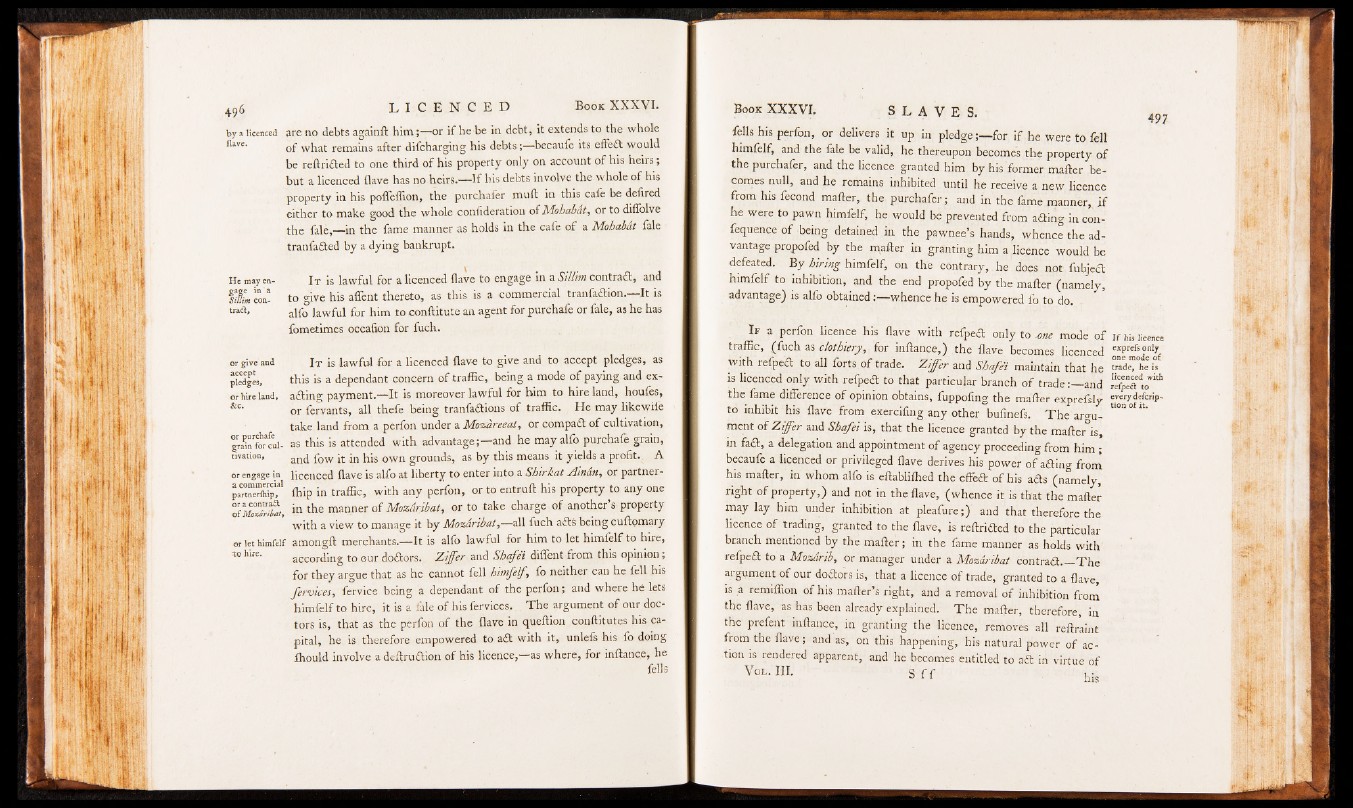
are no debts againft him;— or if he be in debt, it extends to the whole
of what remains after difcharging his debts;— becaufe its effect would
be reftrided to one third of his property only on account of his heirs;
but a licenced Have has no heirs.— If his debts involve the whole of his
property in his poffeffion, the purchafer muft in this cafe be defired
either to make good the whole conlideration of Mohabdt, or to diflolve
the fale,— in the fame manner as holds in the cafe of a Mohabdt fale
tranfaded by a dying bankrupt.
He may en- I T is lawful for a licenced Have to engage in a Sillim contrail, and
ta L ion- to give his affent thereto, as this is a commercial tranfadion.— It is
traft' alfo lawful for him to conftitute an agent for purchafe or fale, as he has
fometimes occafion for fuch.
or give and Jx is lawful for a licenced Have to give and to accept pledges, as
pkd|«, this is a dependant concern of traffic, being a mode of paying and ex-
or hire land, ailing payment.— It is moreover lawful for him to hire land, houfes,
&c- or fervants, all thefe being tranfailions of traffic. He may likewife
take land from a perfon under a Mozareeat, or compail of cultivation,
graPinrforaia l- as this is attended with advantage;— and he may alfo purchafe grain,
tivation, a n d f o w *t j n own grounds, as by this means it yields a profit. A
or engage in licenced flave is alio at liberty to enter into a Shirkat man, or partnei-
paTeXplal ffiip in traffic, with any perfon, or to entruft his property to any one
° [ S i in the manner of Mozdribat, or to take charge of another’s property
with a view to manage it by Mozdribat,— all fuch ails being cuftomary
or let himfelf amongft merchants.— It is alfo lawful for him to let himfelfto hire,
H hire- according to our dodors. Ziffer and Shafei diffent from this opinion;
for they argue that as he cannot fell himfef, fo neither can he fell his
fervices, fervice being a dependant of the perfon; and where he lets
himfelf to hire, it is a fale of his fervices,. The argument of our doctors
is, that as the perfon of the Have in queftion conftitutes his capital,
he is therefore empowered to aft with it, unlefs his fo doing
fhould involve a deftrudion of his licence,—as where, for inftance, he
fells
b y a licenced
Have.
fells his perfon, or delivers it up in pledge;— for if he were to fell
himfelf, and the fale be valid, he thereupon becomes the property of
the purchafer, and the licence granted him by his former mailer becomes
null, and he remains inhibited until he receive a new licence
from his fecond mailer, the purchafer; and in the fame manner, i f
he were to pawn himfelf, he would be prevented from ading in con-
fequence o f being detained in the pawnee’s hands, whence the advantage
propofed by the mailer in granting him a licence would be
defeated. By hiring himfelf, on the contrary, he does not fubjed
himfelf to inhibition, and the end propofed by the mailer (namely,
advantage) is alfo obtained;— whence he is empowered fo to do. -
I f a perfon licence his Have with refped only to .one mode of
traffic, (fuch as clothiery, for inftance,) the flave becomes licenced
with refped to all forts of trade. Ziffer and S hffei maintain that he
is licenced only with refped to that particular branch o f trade:— and
the fame difference of opinion obtains, fuppofmg the mailer exprefsly
to inhibit his flave from exercifing any other bufinefs. T h e argument
of Ziffer and Shafei is, that the licence granted by the mafter°is,
in fad, a delegation and appointment of agency proceeding from him ;
becaufe a licenced or privileged flave derives his power of ading from
his mailer, in whom alfo is eftablilhed the effed of his ads (namely,
right of property,) and not in the flave, (whence it is that the mailer
may lay him under inhibition at pleafure;) and that therefore the
licence of trading, granted to the flave, is reftrided to the particular
branch mentioned by the mailer; in the fame manner as holds with
refped to a Mozdrib, or manager under a Mozdribat contrad.— T h e
argument of our dodors is, that a licence of trade, granted to a Have,
is a remiffion of his mailer’ s right, and a removal of inhibition from
the flave, as has been already explained. T h e mafter, therefore, in
the prefent mftance, in granting the licence, removes' all reftraint
from the flave; and as, on this happening, his natural power o f action
is rendered apparent, and he becomes entitled to ad in virtue of
V ol. III. S f f his
I f his licence
exprefs only
one mode o f
trade, he is
licenced with
refpeft to
every defcrip-
tion o f it.